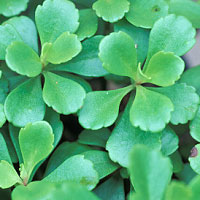Penn Herb Wellness Guide
RhodiolaFind Products
 © Martin Wall
© Martin WallParts Used & Where Grown
There are some 50 species of rhodiola, but it is the fragrant root of the species Rhodiola rosea that is used medicinally. Rhodiola rosea grows throughout the mountainous regions in the higher latitudes and elevations of the Northern hemisphere.
- Reliable and relatively consistent scientific data showing a substantial health benefit.
- Contradictory, insufficient, or preliminary studies suggesting a health benefit or minimal health benefit.
- For an herb, supported by traditional use but minimal or no scientific evidence. For a supplement,little scientific support.
Our proprietary “Star-Rating” system was developed to help you easily understand the amount of scientific support behind each supplement in relation to a specific health condition. While there is no way to predict whether a vitamin, mineral, or herb will successfully treat or prevent associated health conditions, our unique ratings tell you how well these supplements are understood by the medical community, and whether studies have found them to be effective for other people.
For over a decade, our team has combed through thousands of research articles published in reputable journals. To help you make educated decisions, and to better understand controversial or confusing supplements, our medical experts have digested the science into these three easy-to-follow ratings. We hope this provides you with a helpful resource to make informed decisions towards your health and well-being.
This supplement has been used in connection with the following health conditions:
| Used for | Amount | Why |
|---|---|---|
Stress | 170 mg daily of a standardized herbal extract | Rhodiola has been shown to promote feelings of well-being and support mental function. |
Anxiety | 170 mg of a standardized extract twice per day | Taking rhodiola has been shown to significantly improve anxiety symptoms.
|
Mental Performance | Refer to label instructions | In a double-blind study, supplementing with an extract of rhodiola for two weeks significantly improved mental fatigue in a group of physicians during night duty. |
Fatigue | Refer to label instructions | Traditional use and some double blind, test tube, and animal research suggests that rhodiola may treat fatigue. |
Copyright 2025 TraceGains, Inc. All rights reserved.
Learn more about TraceGains, the company.
The information presented by TraceGains is for informational purposes only. It is based on scientific studies (human, animal, or in vitro), clinical experience, or traditional usage as cited in each article. The results reported may not necessarily occur in all individuals. Self-treatment is not recommended for life-threatening conditions that require medical treatment under a doctor's care. For many of the conditions discussed, treatment with prescription or over the counter medication is also available. Consult your doctor, practitioner, and/or pharmacist for any health problem and before using any supplements or before making any changes in prescribed medications. Information expires December 2025.


